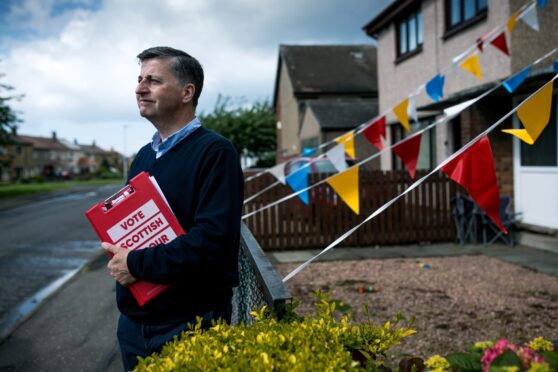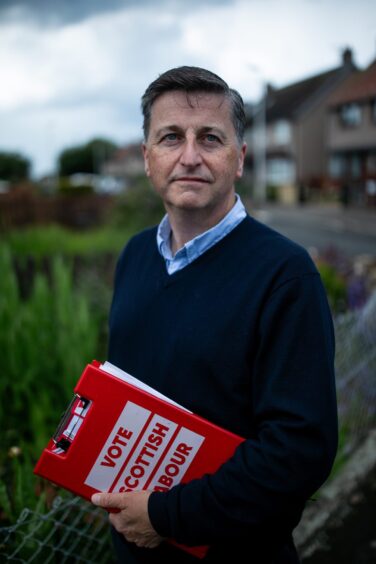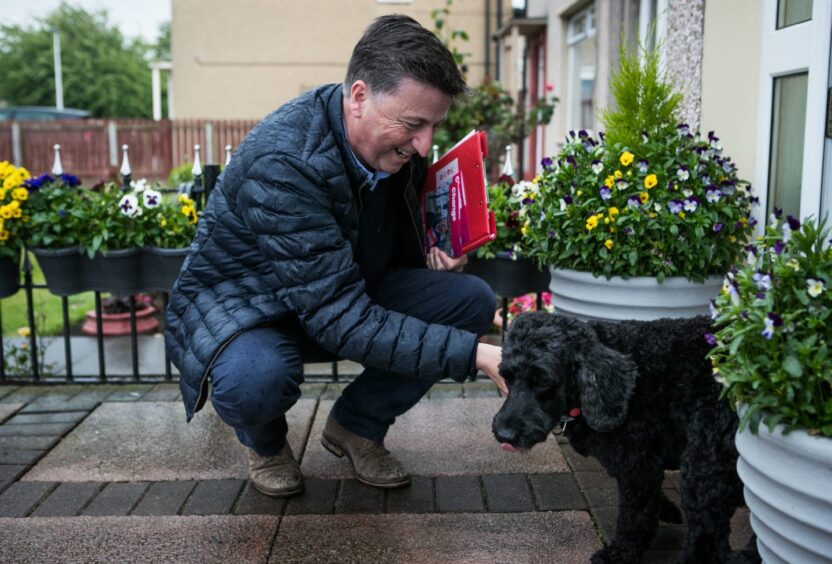
The bunting might be out along the front in Port Seton but, up on Fishers Road, Douglas Alexander is insisting only one party matters.
The flags are up for Gala Day but the Labour politician, one of the country’s most significant election candidates running in one of its bellwether constituencies, is hard at work.
It’s Wednesday afternoon, a traditionally Scottish summer day when, in the time it takes to unlatch a garden gate, blue skies turn to slate and sunshine to driving rain as Alexander, weather beaten and knuckles skint, hits the doors in Lothian East. Again.
The former and aspiring MP, one of the most respected and influential voices in the governments of Tony Blair and Gordon Brown, is on the streets of the constituency, formerly known as East Lothian, three times a day and four on Saturdays.
‘This has to be a change election’
His offensive across the constituency’s five towns and countless villages has been relentless but meant his campaign was off the blocks before Rishi Sunak’s suit dried after his sudden, sodden announcement of a general election on July 4.
Alexander said: “The timing came as a surprise but I was out knocking on doors days after being selected last February and haven’t stopped since.”
His doorstep campaign has, he says, revealed a fractious electorate, increasingly disillusioned with politics but eager for change.
Alexander said: “Perhaps it should be no surprise after the last 10 years but voters don’t like politicians very much. Many just feel beaten up and beaten down by politics and what it has done to their lives.
“SNP voters might be scunnered and Conservatives embarrassed but the most difficult conversations I’m having are with people who no longer believe any party will make a difference. That is just one reason, but possibly the most important, why this has to be a change election.
“This Conservative government has managed to deliver a terrible combination of cruelty and incompetence and people seem ready to do whatever it takes to turn the page on them. We are not only asking people to put their faith in Labour but to keep the faith that politics can make a difference.”
Since the first TV debate on Tuesday, both main party leaders have been accused of concealing the parlous state of public finances and the limited choices of any incoming government.
A Labour government may not find it easy to fund significant, life-changing reforms, admits Alexander, but difficult does not mean impossible. He said: “Look back to 1945 when the country was on its knees after the Second World War and, out of the ruins, we built the NHS.
“Look back to 1997 when we also inherited financial constraints but legislated for a national minimum wage within months.
“Then, my maiden speech made the case against poverty pay, in the teeth of Conservative opposition saying it would cost jobs. Now, our New Deal For Working People will start making a real difference, in the teeth of the very same criticism, from very early in a new Labour government. A committed, serious government with good intent can always make change and improve lives.”
‘We must do better’
Alexander, former MP for Paisley and Renfrewshire South, first arrived in Westminster in 1997 but lost his seat to Mhairi Black as the SNP defenestrated Scottish Labour in 2015.
Since then, Alexander, 56, who served as Scottish Secretary, Transport Secretary and Global Development Secretary, has taught at some of the world’s most respected universities while honing his long-standing expertise in global affairs with working visits abroad.
He said: “This isn’t 1997. The political landscape is different and I am different – definitely a lot older, hopefully a little wiser.
“Some things remain the same though. I love my country and believe politics can make a difference. I believed it then and believe it now.
“Working abroad can offer a new perspective and, when I travel, people ask me ‘What’s happened? We thought you were a serious country?’
“That has to change. We can, and must, do so much better.”
East Lothian was for years solidly Labour but has been represented by three MPs (and three parties) since 2015. One of them, George Kerevan, was then SNP but is standing for Alba this time while the most recent MP, Kenny MacAskill, who took the seat for the SNP from Labour in 2019 with a majority of almost 4,000 before also joining Alex Salmond’s new party, is running in Alloa and Grangemouth.
To return to Westminster, Alexander will need to overcome at least six other candidates and he flatly dismisses any notion that victory is even likely never mind assured.
He said: “There is not a hint of complacency here. With hard work and humility, we are fighting for every vote as if our lives depend on it. This is not a safe Labour seat. There are no safe Labour seats in Scotland.”
He does not fret, however, that his party’s lead in the polls might encourage some voters to stay at home, suspecting the result is a foregone conclusion. He said: “People want change and want to be part of it and that generates an impetus of its own. When drivers see me on the street and slow down, for example, they are almost always wanting to offer encouragement,” he says, before deadpanning, “that has not always been the case in recent years.”
One of his rivals will be Lyn Jardine, the leader of the SNP group in East Lothian Council. However, with constituency data mirroring the national polls, it suggesting Lothian East is likely to send Alexander to Westminster with a comfortable majority.
A return to Westminster?
His return to Westminster could clearly bring a wealth of experience and expertise to a Labour government but he grimaces in frustration when asked about a recent report suggesting he might fill a big seat, possibly at the Foreign Office, in Sir Keir Starmer’s first Cabinet.
Dismissing the speculation as “hugely unhelpful,” he insists the motivation for his return to frontline politics is simple and little to do with big jobs or grand ambition.
He said: “My dad was a minister in the Church of Scotland and my mother was doctor in the NHS. I was raised to see a life of public service as a worthwhile life and I still believe that. If you have the opportunity to make a difference, you should take it.
“We need Scottish Labour to be back at the service of working people and I just want to play my part in that. I am not looking past tomorrow.”
Back on Fishers Road, the rain is letting up and voters’ reception suggests the outlook for Alexander looks brighter still.
Paul Lamb says he has voted Labour all his life and his wife and four children, the youngest is 18, are also on board while his near-neighbour Pauline Branley had stuck a Vote Alexander poster in her porch window before the candidate had closed her gate. She said: “I’m looking forward to the election. We’ve had enough. It’s time for change.”
The flags, the red ones, at least, might be staying up in Port Seton a little longer.

Enjoy the convenience of having The Sunday Post delivered as a digital ePaper straight to your smartphone, tablet or computer.
Subscribe for only £5.49 a month and enjoy all the benefits of the printed paper as a digital replica.
Subscribe © Andrew Cawley
© Andrew Cawley © Andrew Cawley
© Andrew Cawley